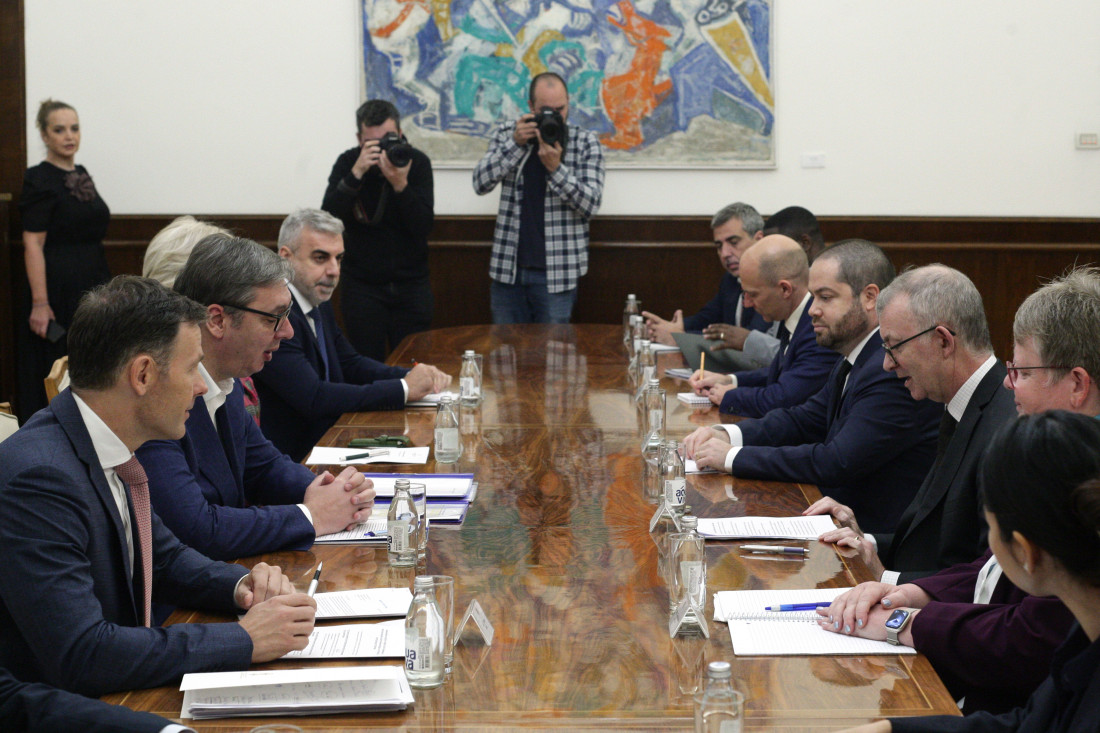Impressive macroeconomic and economic results of Serbia in 2024 – economic growth, strong labor market, reduced inflation, record foreign reserves, and a strong banking sector – have left the delegation of the International Monetary Fund (IMF) in awe after the review of the standby arrangement, said the National Bank of Serbia (NBS).
The discussions between the IMF and representatives of Serbia were held from October 3 to October 15, with two main goals – reviewing the results under the standby arrangement (SBA) and agreeing on an economic program under the three-year Policy Coordination Instrument. Agreements were reached with the IMF team for both goals.
The successful fourth and final review of the current standby arrangement, concluded in December 2022 for a period of 24 months, has been completed. At the same time, an agreement was reached on the economic program and medium-term policies that the IMF will support through the Policy Coordination Instrument (PCI). The PCI is a non-financial advisory instrument for countries implementing strong economic policies, making it the right choice for Serbia. The fact that Serbia has already had two exceptionally successful non-financial instruments of this type, as well as the fact that the current standby arrangement has been considered a precautionary arrangement from the second review onwards (one review earlier than expected at approval), confirms that credible policies are being implemented in Serbia.
Under the PCI instrument, Serbia commits to ensuring that fiscal deficits do not exceed 3.0% of GDP for the period 2025-2027, prioritizing spending in case of fiscal shocks, and ensuring that wage and pension increases are in line with the fiscal rules adopted in 2022. In case of additional pressures on fiscal spending, authorities commit to additional prioritization of public spending.
The PCI will strike a balance between the needs of public investment and social expenditure in Serbia and continuous fiscal discipline to support sustainable growth while ensuring that public debt continues to decline.
„Given the strong progress Serbia has made over the past twelve years, the PCI should support the preservation of the achievements and the continuation of an ambitious reform agenda,“ said Governor Jorgovanka Tabaković.
The agreements reached are expected to be approved by the IMF Executive Board in December.
„After the previous IMF mission in March of this year, I said that the period ahead would officially bring Serbia into the group of investment-grade countries, which Serbia deserves. Congratulations to all of us for achieving the investment grade that Serbia has long deserved! The new assessments by the IMF confirm that we are implementing good policies in Serbia, strengthening our economy and conditions for further rating growth. There are all reasons for real optimism because these conditions make it easier to make decisions in the medium and long term, hence further employment growth and overall societal progress,“ said Governor Jorgovanka Tabaković.
According to the NBS, after two weeks of discussions, the IMF concludes:
– The macroeconomic results in Serbia are strong.
– Economic growth and the labor market are robust.
– Inflation is reduced.
– Foreign reserves are at a record level.
– The financial sector is well-capitalized and liquid.
– The share of public debt in GDP continues to decline.
The IMF also notes that thanks to the strong economic program implemented by Serbia, supported by the IMF standby arrangement, and with continuous commitment to strong economic policies, S&P agency in October assigned Serbia an investment-grade credit rating for the first time.
The macroeconomic results of Serbia in 2024 are impressive. The IMF estimates that growth in 2024 will reach 3.9% and then accelerate to around 4.25% in the following years. Inflation has returned to the targeted corridor of the National Bank of Serbia, thanks to monetary policy measures and the reduction in energy and food prices.
Minister Mali: Great news for citizens and the economy
Deputy Prime Minister and Minister of Finance Siniša Mali stated that the agreement for Serbia to conclude a new non-financial arrangement with the IMF, lasting three years, is a good and clear signal for citizens, the domestic economy, and foreign investors.
„A very important and big news for the citizens of Serbia when it comes to our economy. These were tough talks, but I would say very successful in the end. With the help of the standby arrangement, we stabilized our public finances at that time, withstood that major shock and the blow of the global crisis, and started with the restructuring of our energy sector and adopted a plan for the restructuring of Elektroprivreda Srbije, which is underway. We then adopted a new methodology for calculating gas prices and electricity prices. We have also adopted a new Law on the Management of State Owned Enterprises, which should increase their efficiency and productivity… Now we have agreed on a new arrangement – PCI, which relates to the coordination of monetary and fiscal policies – and we have agreed to continue reforms, mainly in the energy sector and reforms of state enterprises,“ said Mali.
The increase in the fiscal deficit to 2.7% of GDP in 2024 will be used to finance additional needs in infrastructure, social policy, and defense. It is expected that public debt will fall to around 48% of GDP by the end of 2024 due to strong fiscal revenues, robust economic growth, and a recent upward revision of GDP.
The IMF also expects continued strong inflows of foreign direct investment, which will be more than enough to cover the current account deficit, as seen in the past ten years.
Key macroeconomic risks include external demand, global commodity prices, deepening geo-economic fragmentation, and the exposure of agricultural production and economic activity to the impact of climate change and extreme weather conditions.
Serbia has built sufficient reserves and mechanisms to defend against risks primarily coming from the external environment. Foreign reserves and state deposits are high, public debt and external debt are sustainable, and the banking sector is strong. In addition, continuity of prudent policies is necessary as an additional important protective mechanism.
„The secured record foreign reserves and preserved relative stability of the exchange rate of the dinar against the euro have been and remain important pillars of business certainty and the preservation of the financial stability of the country. The inflation within the target range of the National Bank of Serbia, record dinar savings, and the lowest share of problematic loans testify to monetary and financial stability. All this, along with expected acceleration of GDP growth in the range between 4% and 5% in the coming years, is an indicator that Serbia is in excellent hands,“ concluded Governor Jorgovanka Tabaković.




